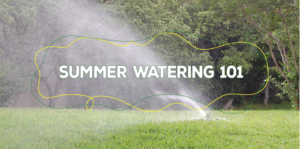How to Water Plants Efficiently in Summer

Summer is here, and with it comes the challenge of keeping our green friends hydrated and healthy. Imagine you're on a scorching beach, desperate for a cold drink. Plants feel the same way during a heatwave, but they can't just grab a bottle of water. So, how do you quench their thirst efficiently? Let's dive into the art of summer watering, exploring plant hydration, water conservation, and smart irrigation systems.
Understanding Summer Watering
Before we get into the how, let's understand the why. Summer watering is crucial because heat and prolonged sunlight cause plants to lose moisture faster. It's like when you step out of a cool shower into a hot room - you start to 'evaporate' instantly. Plants experience this too, a process known as transpiration.
Signs Your Plants Need Water
Plants can't talk, but they do give signals when they're thirsty. Look out for:
- Wilting or drooping leaves
- Yellowing or browning leaves
- Dry, cracked soil
- Slow growth
The Goldilocks Method: Not Too Much, Not Too Little
Finding the right balance is key to plant hydration. Too little water can cause them to wilt and die, while too much can lead to root rot and fungal diseases. So, how do you find that sweet spot?
The Finger Test
Stick your finger about 2 inches into the soil. If it feels dry, it's time to water. If it's moist, wait a day or two. This simple test works wonders for both indoor and outdoor plants.
Water Deeply but Infrequently
Deep watering encourages root growth, making plants more drought-resistant. Think of it like training for a marathon - you want your plants to build endurance. Shallow, frequent watering does the opposite, creating weak, shallow root systems.
Heatwave Gardening: Timing is Everything
Timing matters when it comes to heatwave gardening. Water early in the morning or late in the evening to minimize evaporation. Avoid midday watering; the sun can scorch wet leaves, causing more harm than good.
The Benefits of Early Morning Watering
Morning watering sets your plants up for the day, like a hearty breakfast. It also helps prevent fungal diseases by giving leaves time to dry before nightfall.
Water Conservation: Every Drop Counts
Summer often means drought and water restrictions. But even without these, water conservation is essential. Here's how you can save water and keep your plants happy:
Mulching
Mulch is like sunscreen for your soil. It reduces evaporation, keeps roots cool, and suppresses weeds. Organic mulches, like wood chips or straw, also improve soil health.
Collect Rainwater

Every time it rains, you're missing an opportunity if you're not collecting water. Rain barrels can save you money and provide chemical-free water for your plants.
Choose Drought-Tolerant Plants
Plants like succulents, lavender, and bougainvillea thrive in hot, dry conditions. By choosing these, you'll save water and create a beautiful, low-maintenance garden.
Smart Irrigation Systems: The Future of Watering
Irrigation systems have come a long way. Today, smart systems can save you time, water, and money.
Drip Irrigation
Drip systems deliver water directly to plant roots, minimizing waste. They're perfect for gardens, vegetable patches, and container plants.
Smart Controllers

Smart controllers use weather data and soil moisture sensors to adjust watering schedules automatically. Some even connect to your phone, allowing you to control your irrigation system from anywhere.
Conclusion: Be a Smart Gardener
Efficient summer watering isn't just about keeping your plants alive; it's about helping them thrive while conserving water. By understanding plant hydration, practicing smart watering techniques, and investing in efficient irrigation systems, you can create a lush, water-wise garden.
So, are you ready to be a smart gardener? Remember, every drop counts, and every plant matters. Happy watering!
FAQs
How often should I water my plants in summer?
- There's no one-size-fits-all answer. Factors like plant type, soil, weather, and location matter. Use the finger test to determine when your plants need water.
Should I water plants at night?
- Night watering can invite fungal diseases. It's best to water in the early morning or late evening.
How can I tell if I'm overwatering my plants?
- Signs of overwatering include yellowing leaves, wilting despite wet soil, and mold or mildew on the soil surface.
What is the best way to water potted plants?
- Water potted plants until water runs out of the drainage holes. This ensures the entire root ball is moist.
Can I use greywater for my plants?
- Yes, greywater from baths, showers, and washing machines can be used to water plants. However, avoid using water with harsh chemicals or bleach.
For more tips on gardening and plant care, check out these resources from the Royal Horticultural Society and Gardeners' World.
0 Response to "How to Water Plants Efficiently in Summer"
Post a Comment